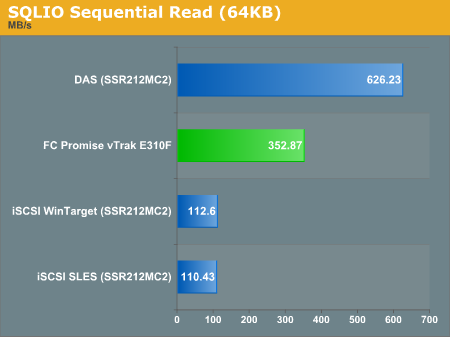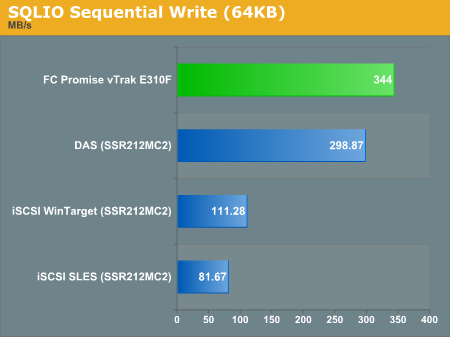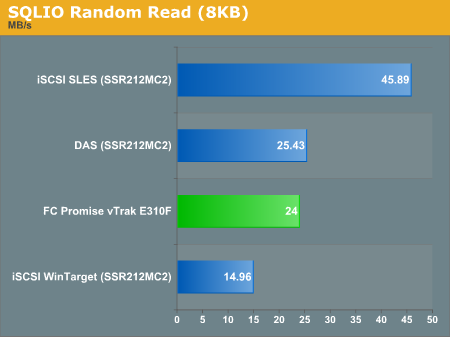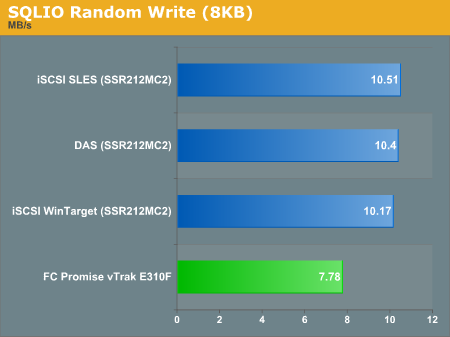Affordable storage for the SME, part one
by Johan De Gelas on November 7, 2007 4:00 AM EST- Posted in
- IT Computing
SQLIO
SQLIO is a tool provided by Microsoft which can determine the I/O capacity of a given disk subsystem. It should simulate somewhat how MS SQL 2000/2005 accesses the disk subsystem. The following tests use RAID 5. You can see a typical SQLIO test command below:
sqlio" -s120 -b64 -LS -o16 -fsequential file.tst >> result.txt
We ran tests as long as 1000 seconds, but there was very little difference with our standard 120 second testing.

The SQLIO results mimic the I/O Meter results. The DAS configuration is limited by the maximum throughput of our disks, and the other configurations are limited by their interface speed.

The VTRAK E310f outruns the rest in the SQLIO sequential write test. An important reason is that as we write, parity blocks have to be recalculated and a fast 1.2 GHz IOP processor helps in this scenario.
Next, we tested with Random reads.

Surprisingly, the iSCSI SLES target is almost twice as fast as our DAS configuration. Thus, the SLES target is essentially faster than the "maximum performance" of the disk array. This is the result of rather clever caching as we will show further.

The SQLIO random write was the only test where the Promise VTRAK E310f was a bit slower than the rest of the pack. We could not determine any reason for this.
SQLIO is a tool provided by Microsoft which can determine the I/O capacity of a given disk subsystem. It should simulate somewhat how MS SQL 2000/2005 accesses the disk subsystem. The following tests use RAID 5. You can see a typical SQLIO test command below:
sqlio" -s120 -b64 -LS -o16 -fsequential file.tst >> result.txt
We ran tests as long as 1000 seconds, but there was very little difference with our standard 120 second testing.

The SQLIO results mimic the I/O Meter results. The DAS configuration is limited by the maximum throughput of our disks, and the other configurations are limited by their interface speed.

The VTRAK E310f outruns the rest in the SQLIO sequential write test. An important reason is that as we write, parity blocks have to be recalculated and a fast 1.2 GHz IOP processor helps in this scenario.
Next, we tested with Random reads.

Surprisingly, the iSCSI SLES target is almost twice as fast as our DAS configuration. Thus, the SLES target is essentially faster than the "maximum performance" of the disk array. This is the result of rather clever caching as we will show further.

The SQLIO random write was the only test where the Promise VTRAK E310f was a bit slower than the rest of the pack. We could not determine any reason for this.










21 Comments
View All Comments
microAmp - Wednesday, November 7, 2007 - link
I was just about to post something similar. <thumbsup>